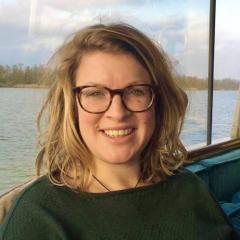Learn essential Dutch vocabulary and question words related to professions and university studies. This beginner A1 lesson covers common jobs, study terms, verb conjugations in present tense, and practical dialogues to help you ask and answer questions about work and education in everyday situations.
Listening & reading materials
Practice vocabulary in context with real materials.
Vocabulary (16) Share Copied!
Exercises Share Copied!
These exercises can be done together during conversation lessons or as homework.
Exercise 1: Reorder sentences
Instruction: Make correct sentences and translate.
Exercise 2: Match a word
Instruction: Match the translations
Exercise 3: Cluster the words
Instruction: Place the following words in the correct group: professions or words about study and questions.
Beroepen
Studie en vragen
Exercise 4: Translate and use in a sentence
Instruction: Pick a word, translated and use the word in a sentence or dialogue.
1
De student
The student
2
De leraar
The teacher
3
De bestuurder
The driver
4
De politieagent
The police officer
5
Studeren
To study
Oefening 5: Gespreksoefening
Instructie:
- Noem de beroepen van elke persoon. (Say the professions of each person. )
- Wat is uw beroep? (What is your profession?)
Teaching guidelines +/- 10 minutes
Example phrases:
|
De jongeman is een student. The young man is a student. |
|
De vrouw is monteur. The woman is a mechanic. |
|
Michael is een politieagent. Michael is a police officer. |
|
Giulia is een journalist. Giulia is a journalist. |
|
Wat doe je voor werk? What do you do for a living? |
|
Ik ben een leraar. I am a teacher. |
| ... |
Exercise 6: Dialogue Cards
Instruction: Select a situation and practice the conversation with your teacher or fellow students.
Exercise 7: Multiple Choice
Instruction: Choose the correct solution
1. Ik ___ als leraar aan de universiteit.
(I ___ as a teacher at the university.)2. Jij ___ hard om je diploma te halen.
(You ___ hard to get your diploma.)3. Wie ___ er als dokter in jouw buurt?
(Who ___ as a doctor in your neighborhood?)4. We ___ onze opdrachten elke week.
(We ___ our assignments every week.)Exercise 8: My work and study
Instruction:
Verb Tables
Werken - To Work
ONVOLTOOID TEGENWOORDIGE TIJD
- ik werk
- jij werkt
- hij/zij/het werkt
- wij werken
- jullie werken
- zij werken
Doen - To Do
ONVOLTOOID TEGENWOORDIGE TIJD
- ik doe
- jij doet
- hij/zij/het doet
- wij doen
- jullie doen
- zij doen
Studeren - To Study
ONVOLTOOID TEGENWOORDIGE TIJD
- ik studeer
- jij studeert
- hij/zij/het studeert
- wij studeren
- jullie studeren
- zij studeren
Maken - To Make
ONVOLTOOID TEGENWOORDIGE TIJD
- ik maak
- jij maakt
- hij/zij/het maakt
- wij maken
- jullie maken
- zij maken
Exercise 9: Vraagwoorden (wie, wat, welk(e))
Instruction: Fill in the correct word.
Grammar: Question words (wie, wat, welk(e))
Show translation Show answersWelke, Wat, Welk, Wie
Grammar Share Copied!
It's not the most exciting thing, we admit, but it’s absolutely essential (and we promise it'll pay off)!
Verb conjugation tables for this lesson Share Copied!
Werken to work Share Copied!
Onvoltooid tegenwoordige tijd (OTT)
| Dutch | English |
|---|---|
| (ik) werk | I work |
| (jij) werkt/work | you work |
| (hij/zij/het) werkt | he/she/it works |
| (wij) werken | we work |
| (jullie) werken | you work |
| (zij) werken | they work |
Doen do Share Copied!
Onvoltooid tegenwoordige tijd (OTT)
| Dutch | English |
|---|---|
| (ik) doe | I do |
| (jij) doet / doe | you do |
| (hij/zij/het) doet | he/she/it does |
| (wij) doen | we do |
| (jullie) doen | you do |
| (zij) doen | they do |
Don't see progress when learning on your own? Study this material with a certified teacher!
Do you want to practice Dutch today? That is possible! Just contact one of our teachers today.
Professions and Studies in Dutch
This lesson focuses on basic Dutch vocabulary and sentence structures related to professions and academic studies, ideal for A1 beginners. You will learn common professions such as de dokter (doctor), de leraar (teacher), and de monteur (mechanic), as well as academic terms like universiteit (university) and studeren (to study).
Key Question Words
Essential question words for inquiries about professions and studies are introduced: wie (who), wat (what), and welk(e) (which). These help you form important questions such as:
- Wie werkt er als dokter in dit ziekenhuis? – Who works as a doctor in this hospital?
- Wat studeer jij aan de universiteit? – What are you studying at the university?
- Welk beroep wil je later hebben? – Which profession do you want to have later?
Interactive Dialogues
The course includes dialogues that simulate everyday conversations, such as introducing your job, asking about a colleague’s profession, or talking about your studies. This provides practical experience in speaking and listening.
Verb Usage and Conjugation
Important verbs like werken (to work), doen (to do), studeren (to study), and maken (to make/do) are practiced with present tense conjugations. For example, ik werk (I work), jij werkt (you work).
Word Clusters and Context
The lesson helps categorize vocabulary into groups: professions (beroepen) and study-related words (studie en vragen), aiding memory and comprehension.
Cultural and Linguistic Notes
Unlike English, Dutch questions often invert the subject and verb (e.g., Wie werkt er? instead of "Who works?"). Also, the use of gendered nouns is prevalent, such as de for common gender and het for neuter nouns, which differs from English's lack of grammatical gender. Useful phrases to start conversations include: Wat doet u voor werk? (What do you do for work?), and Welke studie doe je? (What study are you doing?).


























